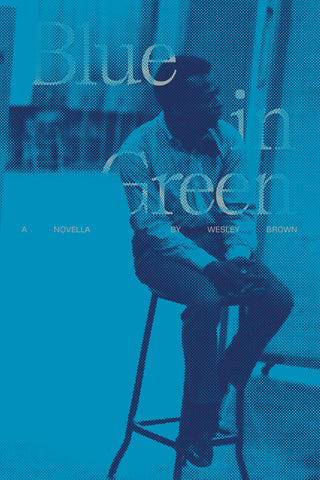BROWN, WESLEY - Blue in Green
“The latest work from the veteran novelist called “one hell of a writer” by James Baldwin, “wonderfully wry” by Donald Barthelme, and a “writer’s writer” by Ishmael Reed, Blue in Green narrates one evening in August 1959, when, only eight days after the release of his landmark album Kind of Blue, Miles Davis is assaulted by a member of New York City Police Department outside of Birdland. In the aftermath of Davis’s brief stint in custody, we enter the strained relationship between Davis and the woman he will soon marry, Frances Taylor, whom he has recently pressured into ending her run as a performer on Broadway and retiring from modern dance and ballet altogether. Frances, who is increasingly subject to Davis’s temper—fueled by both his professional envy and substance abuse—reckons with her strict upbringing, and, through a fateful meeting with Lena Horne, the conflicting demands of motherhood and artistic vocation. Meanwhile, blowing off steam from his beating, Miles speeds across Manhattan in his Ferrari. Racing alongside him are recollections of a stony, young John Coltrane, a combative Charlie Parker, and the stilted world of the Black middle class he’s left behind.
Blank Forms’s release of Blue in Green continues the contemporary reenagement with Brown’s work which began with last year’s new McSweeny’s reprint of Tragic Magic, the author’s first novel. Published in 1978 and edited by Toni Morrison, Tragic Magic concerns Melvin Ellington, a man jailed for protesting the Vietnam War; Brown began work on the novel while himself incarcerated on the same charges. In 1992, the author wrote Life During Wartime, a play about the death of street artist Michael Stewart, a victim of police brutality who died in custody. Blue in Green again interrogates detention’s personal, political, and cultural consequences.
A historical novel much like his 1994 volume Darktown Strutters, the story of a minstrel performer, Blue in Green takes up the voices of a multitude of twentieth-century entertainers at a pivotal moment in American culture and race relations. Staging the conversations of not only Davis, Taylor, Horne, Parker, and Coltrane but also Eartha Kitt, Billie Holiday, and Bill Evans, Brown engages facts to explore relationships between artists of different generations, races, and genders, all of whom must negotiate their positions in what Davis irreverently calls “the business’ known as show.
WESLEY BROWN (b. 1945) is an Atlanta-based writer and educator whose work spans fiction, poetry, biography, theater, and film. His oeuvre is distinguished by its attention to the musicality of speech and its balance of humorous, ironic, and political engagement with American history. In 1956, while a student at State University of New York at Oswego, Brown joined the Student Nonviolent Coordinating Committee, moving south to register voters with the Mississippi Freedom Democratic Party near the Tennessee border, where he first began to write poetry. After an arrest at a demonstration in Jackson, Mississippi, he graduated college and moved to Rochester, New York, in 1968, where he became an active member of the Black Panther Party before returning to his native New York City to join writing workshops led by Sonia Sanchez and John Olliver Killens. In 1972 he was arrested as a conscientious objector to the Vietnam War; in a statement to the draft board he quoted the Panther’s Ten Point Program, adding, with his signature use of idiomatic expression, “If you can’t relate to that, you can walk chicken with your ass picked clean.” He served an eighteen month sentence at Lewisburg Federal Penitentiary in Pennsylvania, which informed the writing of his recently reissued first novel, Tragic Magic (Random House)—edited by Toni Morrison and released to wide acclaim by writers including James Baldwin, Donald Barthelme, and Ishmael Reed in 1978. His short fiction and essays have been published widely, from movement publications such as Liberator to glossies including Essence. For twenty-six years Brown taught literature and creative writing at Rutgers University in New Jersey. During this time he was involved with the National Association of Third World Writers; co-edited celebrated collections of multicultural American literature, authored the historical novel Darktown Strutters (Cane Hill, 1994) and award-winning plays including Boogie Woogie and Booker T. (1987) and Life During Wartime (1992); and wrote, with Thulani Davis, Toni Cade Bambara, and Amiri Baraka, the screenplay for W.E.B. Du Bois: A Biography in Four Voices (1996). After retiring, he relocated to New England, where he taught at Bard College at Simon’s Rock in Massachusetts and Bennington College in Vermont, and authored his third novel, Push Comes to Shove (Concord Free Press, 2009), and the short story collection Dance of the Infidels (Concord ePress, 2017).” - Blank Forms
-
Sale
- Regular price $20.00


